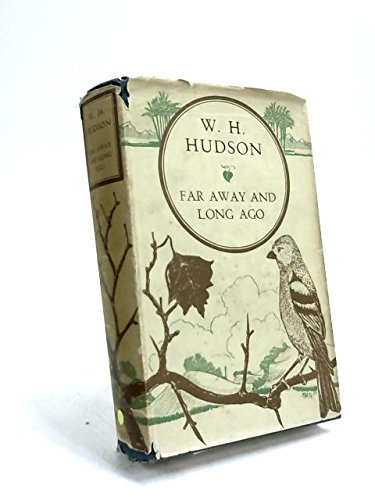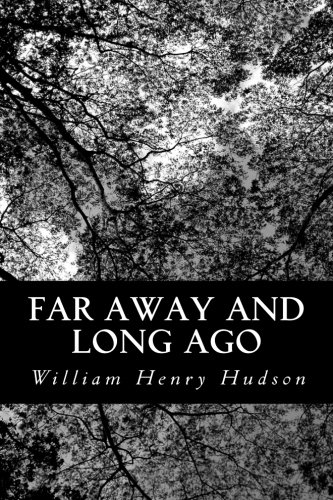-
Far Away and Long Ago
W. H. (William Henry) Hudson
Paperback (Independently published, Sept. 24, 2019)It was never my intention to write an autobiography. Since I took to writing in my middle years I have, from time to time, related some incident of my boyhood, and these are contained in various chapters in The Naturalist in La Plata, Birds and Man, Adventures among Birds, and other works, also in two or three magazine articles: all this material would have been kept back if I had contemplated such a book as this. When my friends have asked me in recent years why I did not write a history of my early life on the pampas, my answer was that I had already told all that was worth telling in these books. And I really believed it was so; for when a person endeavours to recall his early life in its entirety he finds it is not possible: he is like one who ascends a hill to survey the prospect before him on a day of heavy cloud and shadow, who sees at a distance, now here, now there, some feature in the landscape—hill or wood or tower or spire—touched and made conspicuous by a transitory sunbeam while all else remains in obscurity. The scenes, people, events we are able by an effort to call up do not present themselves in order; there is no order, no sequence or regular progression—nothing, in fact, but isolated spots or patches, brightly illumined and vividly seen, in the midst of a wide shrouded mental landscape.(...)The house where I was born, on the South American pampas, was quaintly named Los Veinte-cinco Ombues, which means "The Twenty-five Ombu Trees," there being just twenty-five of these indigenous trees— gigantic in size, and standing wide apart in a row about 400 yards long. The ombu is a very singular tree indeed, and being the only representative of tree-vegetation, natural to the soil, on those great level plains, and having also many curious superstitions connected with it, it is a romance in itself. It belongs to the rare Phytolacca family, and has an immense girth—forty or fifty feet in some cases; at the same time the wood is so soft and spongy that it can be cut into with a knife, and is utterly unfit for firewood, for when cut up it refuses to dry, but simply rots away like a ripe water-melon. It also grows slowly, and its leaves, which are large, glossy and deep green, like laurel leaves, are poisonous; and because of its uselessness it will probably become extinct, like the graceful pampas grass in the same region. In this exceedingly practical age men quickly lay the axe at the root of things which, in their view, only cumber the ground; but before other trees had been planted the antiquated and grand-looking ombu had its uses; it served as a gigantic landmark to the traveller on the great monotonous plains, and also afforded refreshing shade to man and horse in summer; while the native doctor or herbalist would sometimes pluck a leaf for a patient requiring a very violent remedy for his disorder. Our trees were about a century old and very large, and, as they stood on an elevation, they could be easily seen at a distance of ten miles. At noon in summer the cattle and sheep, of which we had a large number, used to rest in their shade; one large tree also afforded us children a splendid play- house, and we used to carry up a number of planks to construct safe bridges from branch to branch, and at noon, when our elders were sleeping their siesta, we would have our arboreal games unmolested.- Taken from "Far Away and Long Ago" written by William Henry Hudson
-
Far Away and Long Ago
W. H Hudson
Hardcover (Dent, March 15, 1900)None
-
Far Away and Long Ago
W. H. Hudson
Paperback (CreateSpace Independent Publishing Platform, Dec. 14, 2017)William Henry Hudson (4 August 1841 – 18 August 1922) was an author, naturalist, and ornithologist.Hudson was born in Quilmes, near Buenos Aires, Argentina. He was the son of Daniel Hudson and his wife Catherine née Kemble, United States settlers of English and Irish origin. He spent his youth studying the local flora and fauna and observing both natural and human dramas on what was then a lawless frontier, publishing his ornithological work in Proceedings of the Royal Zoological Society, initially in an English mingled with Spanish idioms. He had a special love of Patagonia.
-
Far Away And Long Ago. A History Of My Early Life
W.H. Hudson
Hardcover (J.M. Dent & Sons, March 15, 1935)Far Away and Long Ago A History of My Early Life
-
Far Away and Long Ago
W. H. Hudson
Hardcover (E. P. Dutton, March 15, 1935)None
-
Far Away and Long Ago
W. H. Hudson
Hardcover (E. P. Dutton & Co., March 15, 1927)None
-
Far Away and Long Ago
W. H. Hudson
Paperback (Blurb, March 11, 2017)It is easy to fall into the delusion that the few things thus distinctly remembered and visualized are precisely those which were most important in our life, and on that account were saved by memory while all the rest has been permanently blotted out. That is indeed how our memory serves and fools us; for at some period of a man's life-at all events of some lives-in some rare state of the mind, it is all at once revealed to him as by a miracle that nothing is ever blotted out.
-
Far Away and Long Ago
William Henry Hudson
Paperback (CreateSpace Independent Publishing Platform, June 13, 2013)Far Away and Long Ago
-
Far Away and Long Ago
W. H. Hudson
Hardcover (E. P. Dutton & Co. [1925], New York, March 15, 1925)None
-
Far Away And Long Ago:
William Henry Hudson
Paperback (ReadHowYouWant.com, Dec. 12, 2007)In the book the author recalls his tranquil and pleasant childhood in Argentina. He recalls all the wonders of wild life and natural scenery that shaped and moulded his personality. A remarkable work that analyses the factors affecting personality.
-
Far Away and Long Ago
By (author) W. H. (William Henry) Hudson
Paperback (tredition GmbH, March 15, 2011)This book is part of the TREDITION CLASSICS series. The creators of this series are united by passion for literature and driven by the intention of making all public domain books available in printed format again - worldwide. At tredition we believe that a great book never goes out of style. Several mostly non-profit literature projects provide content to tredition. To support their good work, tre...
-
Far Away and Long Ago
W.H. (William Henry) Hudson
Hardcover (BiblioLife, Aug. 18, 2008)This is a pre-1923 historical reproduction that was curated for quality. Quality assurance was conducted on each of these books in an attempt to remove books with imperfections introduced by the digitization process. Though we have made best efforts - the books may have occasional errors that do not impede the reading experience. We believe this work is culturally important and have elected to bring the book back into print as part of our continuing commitment to the preservation of printed works worldwide.